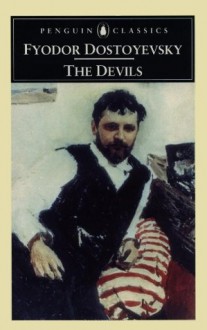
This book, along with a number of other 'bricks', has been sitting on my shelf for quite a while and I realised that if I wanted to reduce number of books that I have not read I was going to have to tackle some of these 'bricks', so since I have already read some of Dostoevsky I decided that I would start off with this one. The ironic thing was that when I checked the website for the Literary Classics Society, of which I am a member, I discovered that the book for this month turns out to be Crime and Punishment. Well, I am now tempted to grab that book from my local bookshop (and the Vintage cover looks pretty cool by the way) and attempt to read it in the two weeks prior to when the club next meets.
Dostoevsky certainly has an interesting view of the world, and the novels of his that I have read tend to be quite dark and gritty (though the only other one happens to be House of the Dead, which doesn't necessarily have a bad ending, though the subject, namely life in a Siberian prison, is pretty horrific). In The Devil's (or The Demons, or The Possessed, depending on the translation that you have, though somebody suggested that the Possessed is not the best translation because it deals with the objects as opposed to the subject) we are taken to a provincial Russian town in the mid-nineteenth century where we see how new ideas from Europe affect the local population. These ideas, the Devil's of the title if you will, are ideas that have been around Europe for quite a while, having come about during the Enlightenment in the mid-eighteenth century. As I have suggested elsewhere, ideas of freedom of thought, freedom of religion, and the concept of political liberty are like a Pandora's box because when they take hold they are very difficult to shake loose. In fact these ideas, which originally came from England, went to the United States, and were then brought back by the French after the war of Independence, changed Europe dramatically (through the French revolution). However, while Western Europe was gripped in revolution, Russia had managed to remain isolated and stuck in the middle ages. In fact there had been no Reformation in Russia so the idea of freedom of religion was not even on the radar, that is until these philosophies came flooding over in the years after the Napoleonic Wars.
Dostoevsky, in this book, is very critical of these new ideas, and it is not as if he wasn't exposed to them. Dostoevsky spent quite a lot of time in Germany as well as travelling around other parts of Europe, but at heart he was Russian Orthodox, and was very dogmatic in that regard. It was not as if he was not radical – he did spend time in Sibera for his views – however he saw the danger in going too far over into these radical spheres, and that danger is clearly outlined in novel.
It is difficult to put one's finger on the exact idea that is explored in this novel – it is Atheism, but it is also Nihilism, and also in a way it could be Anarchism, though that is never mentioned. It could also be a radical form of Socialism, however what we do know is that this idea works on the principle that if a new society is to arise, then the old society must first be completely destroyed, and thus we are taken through an orgy of blood and violence as people are murdered, or commit suicide, and whole villages are burnt to the ground. All the while the secret police are combing the province for these revolutionaries.
The Devil's (or what you wish to call this novel) is certainly a powerful novel, and it also seemed to continue to drag me back in to see how it unfolded and how Dostoevsky understood the nature of humanity, and the destruction that these ideas had on a nation that had not developed enough to understand the ideas that had been filtering over from Europe. However, Europe had had its revolutions, it was just a matter of time before Russia were to have hers. However, while Europe ended up settling into the Social Democracies of the mid to late twentieth centuries, Russia still had yet to emerge from the totalitarian regimes. Maybe it is the case that since Russia was not ready for these ideas, that when these ideas arrived they become corrupted which lead to such extreme results, though the more I think about it, the more I realise that such extreme reactions were not necessarily restricted to Russia.

 Log in with Facebook
Log in with Facebook 








